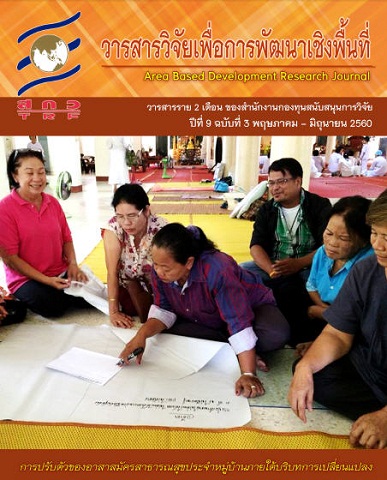การประเมินระบบและกลไกการบริหารจัดการงานวิจัยของหน่วยวิจัยนวัตกรรมเพื่อสังคมและชุมชน (ระยะที่ 2)
Main Article Content
Abstract
หน่วยวิจัยนวัตกรรมเพื่อสังคมและชุมชนได้รับการจัดตั้งขึ้นเพื่อเป็นหน่วยจัดการงานวิจัยเพื่อพัฒนาเชิงพื้นที่ ตั้งแต่ต้นน้ำกลางน้ำและปลายน้ำของการวิจัย เพื่อให้ทราบถึงผลการดำเนินงาน จึงดำเนินการประเมินระบบและกลไกการบริหารจัดการงานวิจัยของหน่วยวิจัยนวัตกรรมเพื่อสังคมและชุมชน (ระยะที่ 2) การวิจัยดังกล่าวมีวัตถุประสงค์ 1) เพื่อประเมินระบบและกลไกการพิจารณาข้อเสนอโครงการวิจัย 2) เพื่อประเมินระบบและกลไกการหนุนเสริมการดำเนินงานวิจัยและ 3) เพื่อประเมินผลการดำเนินงานของหน่วยวิจัยนวัตกรรมเพื่อสังคมและชุมชน (ระยะที่ 2) กลุ่มเป้าหมายผู้ให้ข้อมูลมีจำนวน 7 กลุ่ม รวม 90 คน เครื่องมือและวิธีการที่ใช้ในการเก็บรวบรวมข้อมูล คือ แบบประเมิน 4 ฉบับ และการสนทนากลุ่มนักวิจัยและตัวแทนผู้มีส่วนได้ส่วนเสียวิเคราะห์ข้อมูลเชิงปริมาณด้วยการคำนวณค่าความถี่ร้อยละ ค่าเฉลี่ยและส่วนเบี่ยงเบนมาตรฐาน และวิเคราะห์ข้อมูลเชิงคุณภาพด้วยเทคนิคการวิเคราะห์เนื้อหา ผลการวิจัยพบว่าหน่วยวิจัยนวัตกรรมเพื่อสังคมและชุมชน มีการกำหนดเป้าหมายและกระบวนการดำเนินงานอย่างชัดเจน มีการถอดบทเรียนจากการทำงานเพื่อเรียนรู้ร่วมกันของประชาคมนักวิจัยมีระบบการติดตาม และรายงานความก้าวหน้าแต่ละช่วง ซึ่งเป็นกลไกที่ขับเคลื่อนการดำเนินงานวิจัยให้เป็นไปตามเป้าหมาย โดยอาศัยการหนุนเสริมเพื่อกำหนดทิศทางการวิจัยให้ชัดเจนผ่านผู้ทรงคุณวุฒิ ทั้งนี้หน่วยวิจัยนวัตกรรมเพื่อสังคมและชุมชน ควรสร้างการรับรู้เป้าหมายร่วมกันของประชาคมนักวิจัยทั้งในภาพรวมและเป้าหมายแต่ละพื้นที่เพื่อสร้างความ ตระหนักและความรับผิดชอบร่วมกันในการขับเคลื่อนงานวิจัยเพื่อพัฒนาเชิงพื้นที่ต่อไป
Evaluation on the System and Mechanism of Research Management at the Innovative Research Unit for Society and Community (Phase II)
The Innovative Research Unit for Society and Community was founded to administrate area-based collaborative research, ranging from the upstream, midstream, to downstream of the research process. To gain the information about the results of the research works, this investigation was carried out to evaluate the system and mechanism of research management at the Innovative Research Unit for Society and Community (Phase II). This study aimed at 1) evaluate the system and mechanism of research proposal selection process, 2) evaluate the system and mechanism of research operation reinforcement, and 3) evaluate the output of the Innovative Research Unit for Society and Community (Phase II). A total of 90 informants from 7 target groups were recruited to be the participants of the investigation. There were 2 research instruments adopted in this study: 4 sets of assessment tests and the focus group between the researchers and stakeholders. The data were quantitatively analyzed by using frequency, percentage, average and standard deviation; and the qualitative data were analyzed by the content analysis. The overall findings indicated that, the Innovative Research Unit for Society and Community clearly defined goals and operational processes whereas there was a synthesis of lessons learned from the collaboration of the research community. Each progressive tracking and reporting system is a mechanism to drive research efforts to meet the goals by reinforcing the support and steering the direction of research by qualified experts. The Innovative Research Unit for Society and Community should then determine the shared goals of the research community with the overall vision and goals of each area to create a shared commitment and responsibility to drive research for further area-based development.
Article Details
Area Based Development Research Journal values copyright protection and licensing to safeguard author rights and facilitate the appropriate dissemination of research. Our policies ensure openness, accessibility, and attribution. Authors retain copyright ownership, and articles are published under a Creative Commons Attribution License (CC BY), allowing sharing, adaptation, and proper attribution. Authors have the freedom to publish under the CC BY license, granting broad reuse and distribution permissions. The journal supports posting articles on third-party repositories, adhering to institutional and funding restrictions. Author guidelines detail copyright and licensing requirements, empowering authors with knowledge about their rights and responsibilities. These policies cultivate an environment of collaboration, openness, and responsible sharing, benefiting authors and the research community while honoring intellectual property rights.


